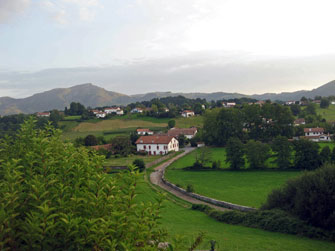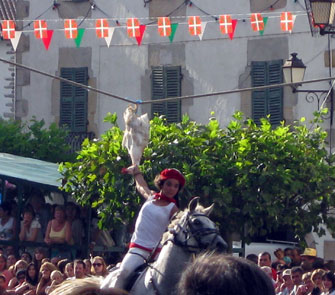
The very first thing I did the very first time I went to Basque Country was make a complete ass of myself. A few years ago, Nancy and I rented a house in the epically beautiful village of Sare, at the foot of the Pyrenees about 4 kilometers north of the Spanish border and 10 kilometers from the Atlantic coast.
Upon arrival, we needed to stock the kitchen, so we went to the main street and made the rounds. Sare has a very good butcher shop, where we purchased enough meat to last a few days. After I had paid, Nancy, who, as an informed and responsible traveler (unlike that guy with her), had taken the trouble to learn a few words of the Basque language, said to the butcher, “eskerrik asko” — Basque for “thank you.”
He looked at her with a puzzled expression for a second and then said, “Oh — that’s what they say on the other side.” Nancy then looked back with a puzzled expression and said, “I thought that was Basque for ‘merci’.” To which the butcher replied, “It is, but here we say ‘mil eskal.’ ‘Eskerrik asko’ is what they say over there.”
By this point the puzzlement was so palpable you could feel it, but I thought I saw the solution and piped up, saying, “Oh — you mean in Spain!”
The butcher looked at me with unpuzzled displeasure and said, more deliberately, “Over there. On the other side.”
I still wasn’t getting it, and repeated, “Yes, you mean it’s what the Basques say on the Spanish side!” To which he replied, with even more displeasure and deliberation, while nodding toward the mountains, “My neighbors. On. The. Other. SIDE.”
Finally, as a friend of mine likes to say, waves of comprehension washed over me: no way was he going to acknowledge Spanish or French dominion over his people. The Basques live on both sides of the Pyrenees, some in France and some in Spain, but consider themselves countrymen.
And rightly so. Their homeland may straddle national borders, but they are a separate people, with a distinctive language and culture that date back to long before anyone had ever dreamed of such fanciful notions as “France” or “Spain.”
How long? Here’s a hint: in Basque, which seems to be unrelated to any other language on earth, the word for “rock” is “haitz.” And a variant of it, “aitz,” is the root of the Basque words for all of the age-old basic tools, the implements that mankind has relied on since time immemorial for survival, including the aitzo (knife), aizkora (axe), aitzur (hoe) and, of course, aitzPhone.
In other words, this is a language that predates the Bronze Age. It has therefore been in existence since well before 3000 BCE and is very likely the descendant of whatever language it was that people spoke in Europe back when every meal was a cookout, humorists told Neanderthal jokes and visitors to art galleries had to watch out for bats.
As befits a venerable culture like theirs, the Basques have many proud traditions. Their architecture is beautiful, especially their enormous white country houses (see photo above). Their cuisine is superb — even the blood sausage (which I don’t usually like) and especially the tapas (see my previous report on these edible objets d’art). And while you’re eating it, the table looks good, too, because they also have lovely traditional linens and flatware.
Nancy and I admire all of those things, so we went back to Sare in September of this year. One of the reasons we picked September was because of the village festival, an annual five-day homage to all things Basque that takes place in the beginning of that month.
The Fête de Sare draws people from all over the region, who come to celebrate traditional Basque food and drink, traditional Basque music, traditional Basque disregard for the public intoxication laws and traditional Basque sports.
The latter is quite an extensive category. The Basques are the originators of pelota, the ball-and-wall game better known internationally as jai alai.
Actually, jai alai is just one of many variations of pelota, or pelote, as they say on the French — oops! I mean northern! — side of the border — oops! I mean mountains! Every village has its fronton, and many of the locals earn a little extra cash selling cestas, the curved glove-like baskets used to fling the small, hard balls at amazingly high speeds. And a lot of extra cash selling first-aid kits and window glass.
The Basques have been bouncing off the walls for centuries, but they also have other traditional sports that are even older, like lifting big stones, which obviously dates back to the Iron Age; tug-of-war contests, which are obviously more recent, dating back only to the Rope Age; arm wrestling, which obviously dates back to the Arm Age; and not getting killed by livestock (Pamplona is in the Basque province of Navarre).
But the most popular sport in Sare, the one that really packs in the crowds at festival time, is that august, time-honored Basque tradition of (no joke) ripping the heads off poultry.
Here again, there are several variations. In the coastal towns, they do it on boats using geese, but inland the slowness of the boats and necktie capacity of the birds are apparently considered an unfair advantage, because in Sare they do it on horseback with ducks:

The rules are simplicity itself: the riders gallop one by one under an unplucked duck hanging from a rope, and whoever manages to snap off its head wins the rest of it.
One of our Basque acquaintances in town called the game “a bit crude.” When I first saw it, my reaction was that this was like calling the Marquis de Sade “a bit self-indulgent.”
But then it occurred to me: I like to eat duck, and I am well aware that the ducks I consume do not die peacefully in their nests surrounded by their beloved eggs and ducklings.
If you’re going to eat birds, someone has to kill birds, and the old-fashioned way of doing that is to wring their necks. No doubt the game was originated ages ago as a means of encouraging young people to learn this skill. And to pick up a little horsemanship, or boatmanship, in the process.
In this light, it seems like a sensible tradition. It transforms three fundamental elements of life — transportation (the horse), technology (the rope) and food preparation (the butchery) — into a spectator sport.
So I watched. And watched and watched.
And watched. At the Sare Festival, the decapitation sweepstakes goes on for at least a dozen ducks (I lost count), and each one is yanked at until manually guillotined, which sometimes takes quite a few tries.
This gave me plenty of time to ponder the existence of this game, and I started to wonder how it has evolved over the years.
I would be willing to guess that they used to do it on foot with live birds (a sport that I would not particularly care to spectate) and that the horses were added later to make it more interesting. And that the use of dead ducks was added some time in the 20th century to make it less revolting.
I also started wondering if the game continues to evolve. Perhaps the concept of what constitutes tradition changes over the years.
If so, what will the duck game look like in the future? How will they combine antiquated transportation, technology and food prep skills in another 100 years?
I predict that the 22nd-century version will use antiques from this century: the contestants will ride Segways under an iPad held aloft by a toy helicopter drone and try to tap the screen. The first one to open the Yelp app wins a duck dinner for two at the nearest three-star restaurant.
A far-fetched vision to be sure, but who’s to say what anyone will be doing in 2114? In any case, by that time, you and I, and everyone reading this, everyone not reading this, the ducks… — we’ll all be over there. On the other side.
Note: As regular readers know, my devotion to the facts is legendary. In the sense of “not real.” For actual reliable information about Basque Country and the Basque people, I recommend the excellent and well-researched book The Basque History of the World, by Mark Kurlansky.
David Jaggard
© 2014 Paris Update
FavoriteAn album of David Jaggard’s comic compositions is now available for streaming on Spotify and Apple Music, for purchase (whole or track by track) on iTunes and Amazon, and on every other music downloading service in the known universe, under the title “Totally Unrelated.”
Note to readers: David Jaggard’s e-book Quorum of One: Satire 1998-2011 is available from Amazon as well as iTunes, iBookstore, Nook, Reader Store, Kobo, Copia and many other distributors.
